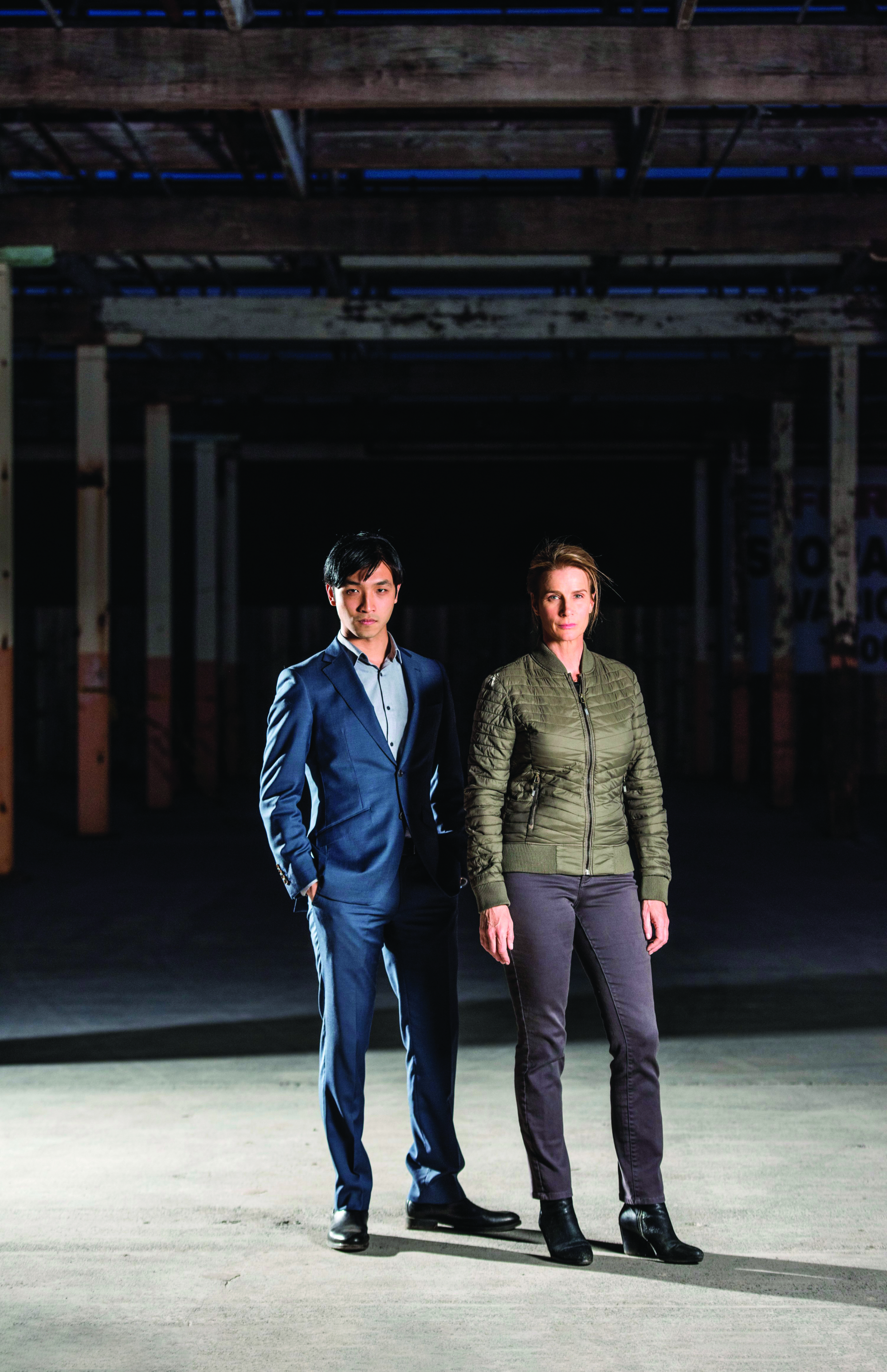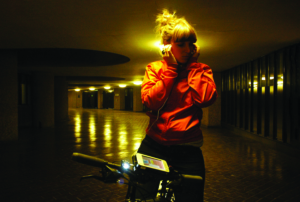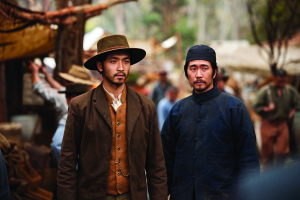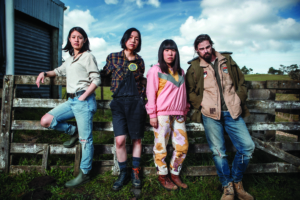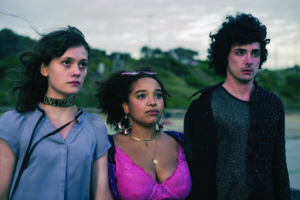Women detectives have been titillating and/or terrorising TV audiences since Honey West (Anne Francis) and her sidekick ocelot, Bruce Biteabit, burst onto the small screen in 1965.[1]Honey West is the protagonist of the eponymous American series broadcast in 1965–1966. Since then, female crime-fighters have become decidedly less camp, trading their catsuits and platform shoes for pantsuits and substance abuse. Dark and stormy women sleuths have come to preoccupy the pop-cultural consciousness, particularly in the last few years – think: Jessica Jones’ eponymous PI, as portrayed by Krysten Ritter; The Killing’s homicide detective Sarah Linden, played by Mireille Enos; and The Fall’s detective superintendent Stella Gibson, as realised by TV’s pre-eminent woman cop, Gillian Anderson.
In Australia, female detectives have flashed their badges in recent series such as Jane Campion’s Top of the Lake: China Girl, Rachel Perkins’ television iteration of Mystery Road and, now, SBS’s Dead Lucky. The last of these stars Rachel Griffiths as tempestuous detective sergeant Grace Gibbs. She’s a hot-headed cop searching the mean streets of Sydney for missing student Bo-Lin (Xana Tang) while hell-bent on avenging a colleague murdered by criminal Corey Baxter (Ian Meadows). Written and co-produced by Ellie Beaumont and Drew Proffitt – who previously worked together on House Husbands, the latter having also helped develop and script Cleverman – the four-part crime drama interrogates the time-honoured dichotomy of ‘good cops’ and ‘bad cops’.
Dead Lucky descends on various local crime syndicates, often defined by their constituents’ cultural background, and depicts the exploitative housing and employment conditions experienced by international students in Australia. Throughout her investigation, Grace also encounters a bevy of mouthy broads who help and hinder her cause. Despite their superficial – usually racial – differences, these witnesses, informants, criminals and accomplices all embody TV’s trope du jour: the ‘difficult woman’.
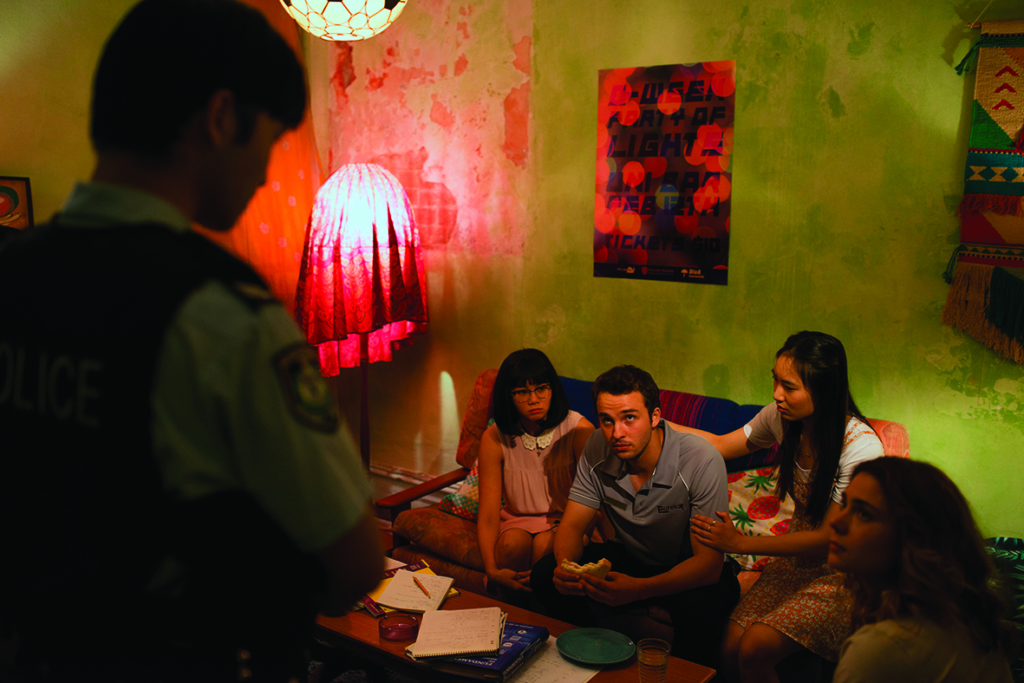
Good cops
On screen, police officers generally represent truth, justice and surety in a conflict-ridden world. They serve and protect their fellow citizens and, perhaps more significantly, the law as an institution. Good cops are brave, morally upstanding heroes – traits that have seen this archetype commonly embodied in Western media by cisgender, heterosexual, Caucasian male characters for decades. Dead Lucky subverts this standard by positioning a woman as the lead detective, and a man of colour – Charlie Fung (Yoson An) – as her protégé and partner.
Good cops are brave, morally upstanding heroes – traits that have seen this archetype commonly embodied in Western media by cisgender, heterosexual, Caucasian male characters for decades. Dead Lucky subverts this standard by positioning a woman as the lead detective.
Witnessing the murder of junior officer Lincoln (Lincoln Younes) has left Grace with symptoms of post-traumatic stress disorder, and we are introduced to our protagonist during a mandated therapy session. A counsellor offers Grace some psychological tools for anger management, but the stoic officer rebuffs them. Later, it’s revealed that she had thrown hot tea at a suspect accused of domestic violence. According to her boss, Richard (Rhys Muldoon), her behaviour is ‘unusual’ – but for whom: a cop or a woman? Probably both, as Grace’s short temper and unwieldy ethical compass are hazards not just at work, but also at home.
In the midst of divorcing her husband, Matt (Matt Nable), Grace does her darnedest to responsibly co-parent their pre-teen daughter, Edie (Julia Savage). This depiction of Grace as a flawed but well-meaning mum is a refreshing contrast to the usual trope of the ‘hardened career woman’ – especially one in law enforcement – who is childless, whether by choice or by circumstance. On top of this, Grace’s unexpected maternal qualities often help her police inquiries. In one particularly memorable scene, she gives breastfeeding instructions to her nemesis’s stepsister, Leah (Sara West), while Charlie grows visibly uncomfortable. Not only does this highlight hypocrisies around behaviours deemed socially inappropriate for each gender – Grace exclaims, ‘Nipple! Nipple! Nipple!’, at once dispelling the tension and airing her frustration at Charlie’s reaction – but it also endears her to Leah, who gradually becomes more cooperative (or, rather, less combative) with the investigators herein.

At times, however, Dead Lucky relies a little too heavily on Grace’s so-called female intuition. While a detective’s hunch is an enduring tool in crime fiction, her occasional capacity to ‘just feel’ or ‘just know’ integral details feels hackneyed, and sells short her learned skills and experience as an investigator. The series’ strongest scenes show Grace on the beat, methodically questioning suspects and pursuing perps – doing her job. In every sense, she is a good cop.
So is Charlie, even if his working relationship with Grace does start on bloodied ground. When he is promoted from uniformed constable to trainee detective, he’s still grief-stricken for Lincoln, his friend and colleague who was murdered on Grace’s watch. He blames her for his mate’s death. She doesn’t like his knick-knacks beautifying their workspace. As the archetypal ‘master’ and ‘apprentice’ soon come to value their respective differences, however, they shape up into a capable ‘rude hero, nice sidekick’ duo.[2]‘Rude Hero, Nice Sidekick’, TV Tropes, <https://tvtropes.org/pmwiki/pmwiki.php/Main/RudeHeroNiceSidekick>, accessed 6 November 2018. Taking turns, they intuitively play to the ‘good cop / bad cop’ – or ‘good cop / ambiguous cop’ – dynamic. Still, Charlie is naive, trusting, just a bit too green. He’s liable to be taken for a ride by sly, duplicitous ‘bad cops’.
Bad cops
Bent, crooked, dirty cops are staples in crime narratives. From sheriff Rosco P Coltrane (James Best) in the original Dukes of Hazzard to pretty much every character on The Shield, bad cops – those with nefarious motives and lax ethical standards – abound on TV, in film and, some would say, in real life.
In Dead Lucky, Charlie is partnered with Grace at the behest of Richard, who, at first, seems authoritative but benevolent. The police boss generously lets his subordinate in on a (very open) secret: that disobedient Grace ‘can be a bit … unprofessional’. Richard asks Charlie to keep tabs on his female colleague, thereby tempting the eager trainee with the metaphorical keys to a very real boys’ club. But Charlie’s loyal nature prevails – he never rats on his partner.
This doesn’t stymie Richard’s vendetta against Grace, whom he needs to circumvent to keep the wheels of his corruption turning. He insists that she visit a counsellor, ostensibly to treat her ‘rage’ issues. Really, he’s trying to undermine her resilience by invoking the damning stereotype that women experiencing mental illness are incompetent at best, dangerous at worst, and always too emotional (throughout the series, Grace is described as ‘crazy’, ‘insane’ and so on). Though Richard claims to be on Grace’s side, blaming her newly restricted duties on ‘the boys upstairs’, her instincts – female or otherwise – prove astute: he is trying to get her fired. In time, Richard’s bravado is shaken by Grace, and Dead Lucky’s bad cop is threatened by its formidably difficult woman. This mirrors contemporary social commentary on white-male fragility[3]See, for example, Charles M Blow, ‘Trump Reflects White Male Fragility’, The New York Times, 4 August 2016, <https://www.nytimes.com/2016/08/04/opinion/trump-reflects-white-male-fragility.html>, accessed 6 November 2018. and destabilises screen media’s traditional standards of herodom.
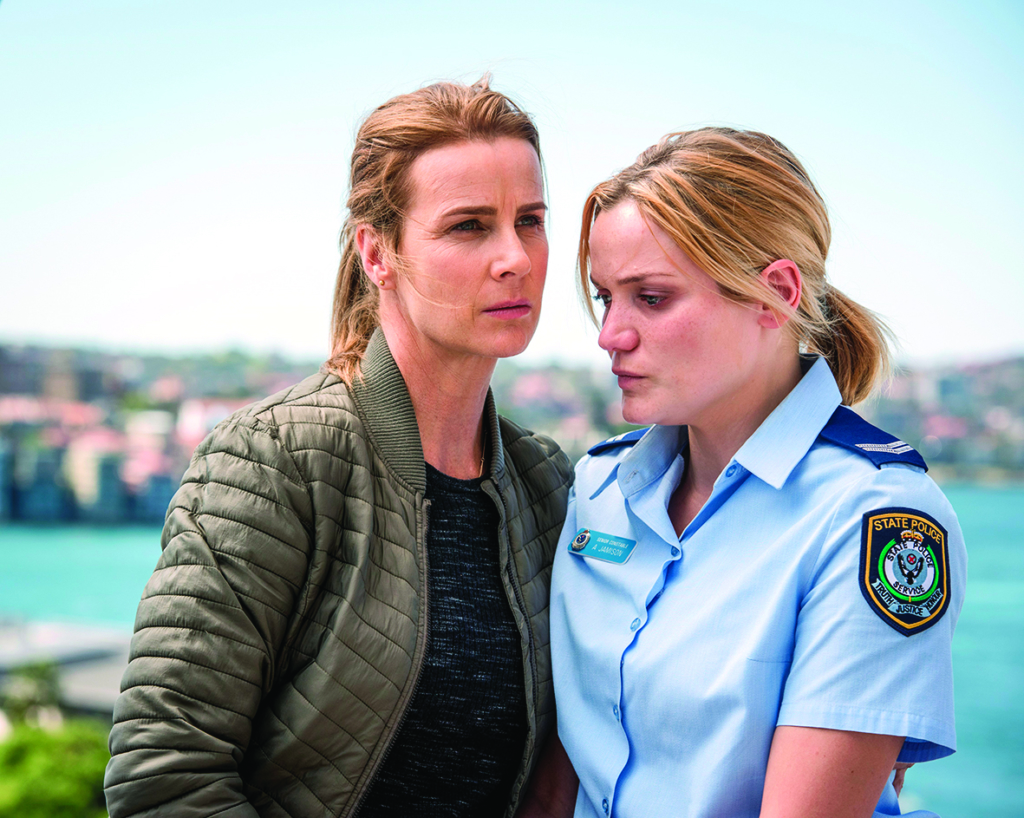
But Richard is not the only crooked cop here, as Lincoln’s grieving spouse, Anna (Anna Samson), also makes some very immoral choices. Vying for the detective traineeship, the insular Anna is overlooked in favour of Charlie. Although they are mourning the same person, her anguish – by virtue of being female – makes her soft and unreliable under Richard’s toxic male gaze. Anna, too, blames Grace for Lincoln’s death, but, unlike Charlie, she trash-talks the senior officer behind her back. This isn’t just a heartbroken widow lashing out; it also speaks to a brand of misogyny that some women internalise to survive in male-dominated workplaces. In this way, Anna is an unwitting agent of the patriarchy, fuelled by latent grief compounded by her colleagues’ distrust in her abilities. Their misgivings beget a self-fulfilling prophecy: the widow’s ‘hysteria’ leads her to accidentally kill Bo-Lin and attempt a subsequent cover-up.
The depiction of a woman killing another woman is a fraught creative choice on Beaumont and Proffitt’s part, more so because it involves a white cop killing a victim of colour. On the gender front, as critic Sarah Marshall notes in her essay ‘Twin Peaks and the Origin of the Dead Woman TV Trope’,
[t]he conversation surrounding difficult women on television (and in fiction) often hinges on the question of likability, and given the overwhelming presence of dead women on television today, it seems all too likely that dead women are the most likable female characters of all. We have seen, recently, how hard a time audiences have with living female characters who are flawed, difficult, troubled, and in other words real.[4]Sarah Marshall, ‘Twin Peaks and the Origin of the Dead Woman TV Trope’, The New Republic, 10 April 2014, <https://newrepublic.com/article/117323/twin-peaks-and-origin-dead-woman-tv-trope>, accessed 6 November 2018.
Although it’s an accident, Anna’s killing of Bo-Lin happens because she’s becoming difficult. Portrayals of ‘difficult’ women’s deaths – and of police brutality and systemic racism, issues that are proving topical across Australia and the world – can create space to further relevant debates in an accessible, communal way.[5]See, for example, Ricardo Lopez & Ted Johnson, ‘Movies, TV Shows Evolve to Reflect a Changing, More Complex View of Police’, Variety, 1 August 2017, <https://variety.com/2017/film/features/police-in-movies-tv-shows-1202511299/>, accessed 6 November 2018. But it’s vital to consider who’s doing the talking and to what end. In Dead Lucky, the murder of the woman of colour only proves incidental to the white woman’s tragic story arc – arguably perpetuating, rather than subverting, real-world race-based inequalities.
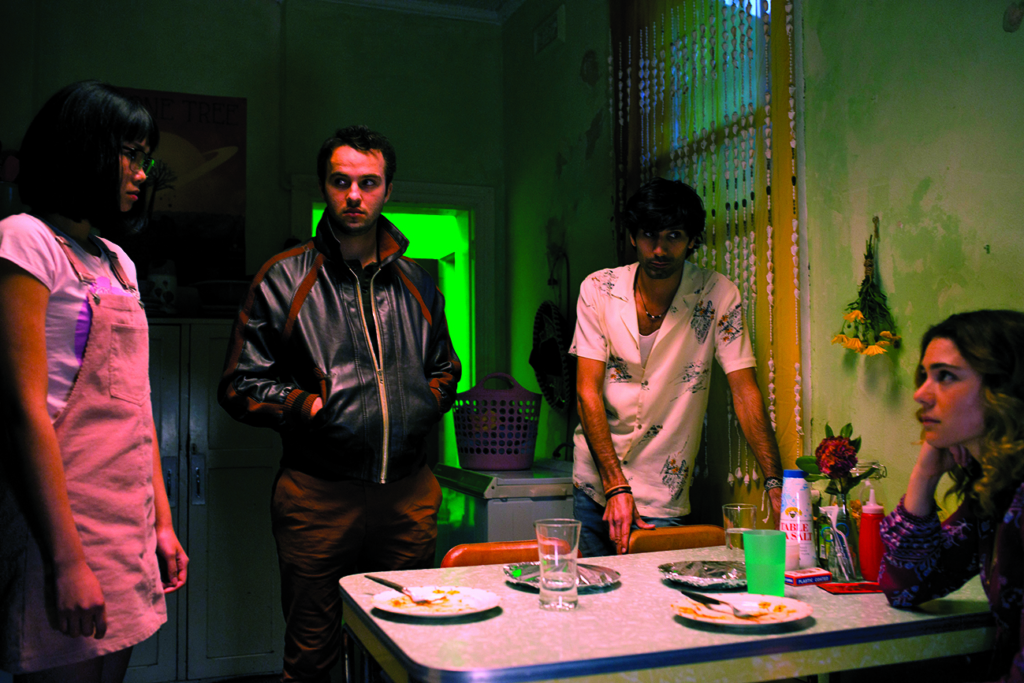
Difficult women
Is Sherlock Holmes strong? It’s not just that the answer is ‘of course’, it’s that it’s the wrong question.
—Sophia McDougall[6]Sophia McDougall, ‘I Hate Strong Female Characters’, New Statesman, 15 August 2013, <https://www.newstatesman.com/culture/2013/08/i-hate-strong-female-characters>, accessed 6 November 2018, emphasis in original.
The difficult woman is a subclass of the ‘strong female character’, which has proliferated in film and television over this past decade – so much so that Netflix curates a ‘taste cluster’ of titles ‘Featuring a Strong Female Lead’. As a matter of boosting women’s representation in traditionally male-dominated genres like crime and action, this is a positive first step. As testament to Gillian Anderson’s quintessential strong female lead, The X Files’ Dana Scully, a report entitled The ‘Scully Effect’ has even sought to demonstrate the value of women’s visibility and leadership in screen stories.[7]21st Century Fox, The Geena Davis Institute on Gender in Media & J. Walter Thompson Intelligence, The ‘Scully Effect’: I Want to Believe … in STEM, 2018, available at <https://impact.21cf.com/wp-content/uploads/sites/2/2018/03/ScullyEffectReport_21CF_1-1.pdf>, accessed 6 November 2018. But is a ‘strong female character’ necessarily a strong character?
‘I hate Strong Female Characters,’ writes novelist Sophia McDougall for New Statesman.
The Strong Female Character has something to prove. She’s on the defensive before she even starts. She’s George from [Enid Blyton’s book series] The Famous Five all grown up and still bleating with the same desperate lack of conviction that she’s ‘Every Bit As Good as a Boy’.[8]McDougall, op. cit.
Even with its veritable harem of strong female characters, Dead Lucky fails to foster healthy – heck, even interesting – relationships between any of the many women on screen. Their connections with one another are stale.
Despite Grace’s intriguing characterisation as a mother and a detective, McDougall’s description of the strong female character – particularly around defensiveness – rings true here. Moreover, it applies to almost all of the women in Dead Lucky. Matt’s new girlfriend, Penny (Annie Maynard), extols the importance of positive female role models for Edie while engaging in passive-aggressive workplace scuffles with Grace. Charlie’s mother, Mrs Fung (Karen Pang), errs uncomfortably towards the ‘tiger mum’ stereotype[9]See Su Yeong Kim, ‘What Is “Tiger” Parenting? How Does It Affect Children?’, Developmental Psychologist, July 2013, <https://www.apadivisions.org/division-7/publications/newsletters/developmental/2013/07/tiger-parenting.aspx>, accessed 6 November 2018. about East Asian parents. And histrionic, henpecking wife Erica’s (Justine Clarke) blatant racism verges on caricature. Even with its veritable harem of strong female characters, Dead Lucky fails to foster healthy – heck, even interesting – relationships between any of the many women on screen. Their connections with one another are stale: Grace and Penny are competitive; Anna is intimidated by Grace’s seniority; Mrs Fung is suspicious of her adult son’s female love interest; the circle of international students, comprising several women, becomes rife with infighting.
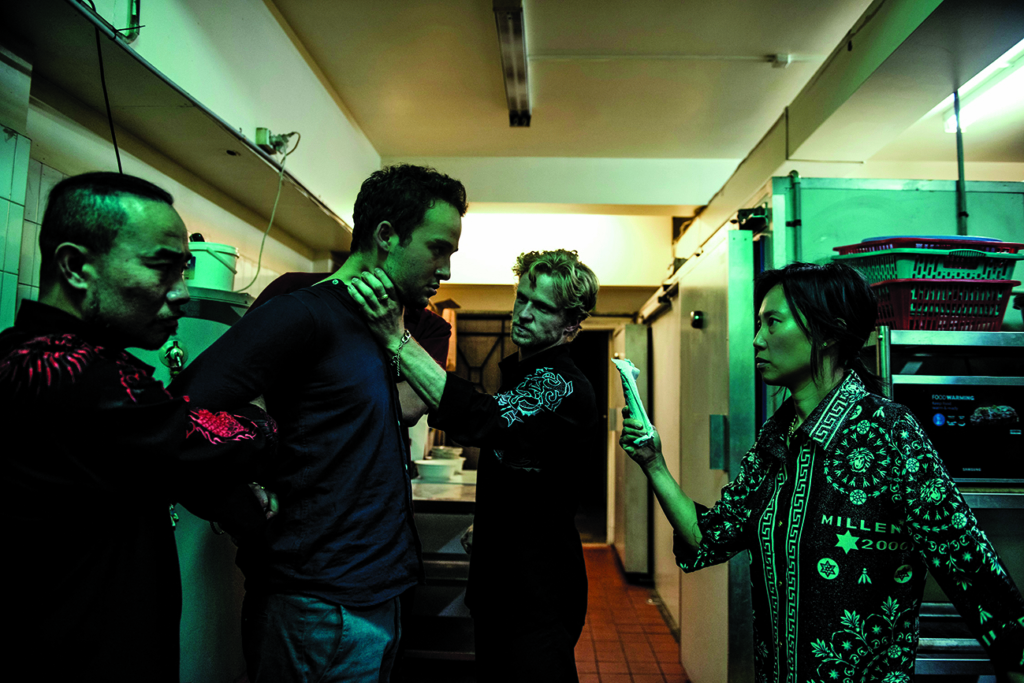
When it comes to representing gender and culture, Dead Lucky has the quantity but not the quality of a contemporaneous show like BBC America’s Killing Eve. This cat-and-mouse spy series that embraces the ever-so-camp aesthetic of its forebears like Honey West is chock-full of strong, flawed, funny, weird, difficult, multidimensional women, which explains its laudatory reception from critics and audiences alike.[10]See, for example, Lucy Mangan, ‘Killing Eve Review – Comedy, Tragedy and Thrills, This Spy Series Has It All’, The Guardian, 16 September 2018, <https://www.theguardian.com/tv-and-radio/2018/sep/15/kiling-eve-review-spy-series-phoebe-waller-bridge-fleabag-writer-feminist-credentials>, accessed 6 November 2018. In contrast, the SBS series has more in common with Top of the Lake: China Girl, whose storyline is propelled by the investigation surrounding a murdered Thai sex worker, and which features a cast of similarly formidable female leads. While Campion’s show was met with criticisms of racism and whorephobia,[11]See, for example, a 10 August 2017 post on the Scarlet Alliance – Australian Sex Workers Association Facebook page, <https://www.facebook.com/scarletalliance.org.au/posts/1578130765571316>, accessed 6 November 2018. Dead Lucky mostly sidesteps these issues, though it does lean on archetypes and clichés to dramatise anxieties about contemporary Australian life.
The real world is rampant with racism, sexism and systemic corruption. Realist fiction is a prime space to critique such issues of social and criminal justice. With its gritty aesthetic and strong female characters, Dead Lucky has progressive politics in its sights. But, by falling back on hard-boiled tropes and stereotypes, the series ultimately shoots itself in the foot.
https://www.sbs.com.au/programs/dead-lucky
Endnotes
| 1 | Honey West is the protagonist of the eponymous American series broadcast in 1965–1966. |
|---|---|
| 2 | ‘Rude Hero, Nice Sidekick’, TV Tropes, <https://tvtropes.org/pmwiki/pmwiki.php/Main/RudeHeroNiceSidekick>, accessed 6 November 2018. |
| 3 | See, for example, Charles M Blow, ‘Trump Reflects White Male Fragility’, The New York Times, 4 August 2016, <https://www.nytimes.com/2016/08/04/opinion/trump-reflects-white-male-fragility.html>, accessed 6 November 2018. |
| 4 | Sarah Marshall, ‘Twin Peaks and the Origin of the Dead Woman TV Trope’, The New Republic, 10 April 2014, <https://newrepublic.com/article/117323/twin-peaks-and-origin-dead-woman-tv-trope>, accessed 6 November 2018. |
| 5 | See, for example, Ricardo Lopez & Ted Johnson, ‘Movies, TV Shows Evolve to Reflect a Changing, More Complex View of Police’, Variety, 1 August 2017, <https://variety.com/2017/film/features/police-in-movies-tv-shows-1202511299/>, accessed 6 November 2018. |
| 6 | Sophia McDougall, ‘I Hate Strong Female Characters’, New Statesman, 15 August 2013, <https://www.newstatesman.com/culture/2013/08/i-hate-strong-female-characters>, accessed 6 November 2018, emphasis in original. |
| 7 | 21st Century Fox, The Geena Davis Institute on Gender in Media & J. Walter Thompson Intelligence, The ‘Scully Effect’: I Want to Believe … in STEM, 2018, available at <https://impact.21cf.com/wp-content/uploads/sites/2/2018/03/ScullyEffectReport_21CF_1-1.pdf>, accessed 6 November 2018. |
| 8 | McDougall, op. cit. |
| 9 | See Su Yeong Kim, ‘What Is “Tiger” Parenting? How Does It Affect Children?’, Developmental Psychologist, July 2013, <https://www.apadivisions.org/division-7/publications/newsletters/developmental/2013/07/tiger-parenting.aspx>, accessed 6 November 2018. |
| 10 | See, for example, Lucy Mangan, ‘Killing Eve Review – Comedy, Tragedy and Thrills, This Spy Series Has It All’, The Guardian, 16 September 2018, <https://www.theguardian.com/tv-and-radio/2018/sep/15/kiling-eve-review-spy-series-phoebe-waller-bridge-fleabag-writer-feminist-credentials>, accessed 6 November 2018. |
| 11 | See, for example, a 10 August 2017 post on the Scarlet Alliance – Australian Sex Workers Association Facebook page, <https://www.facebook.com/scarletalliance.org.au/posts/1578130765571316>, accessed 6 November 2018. |
